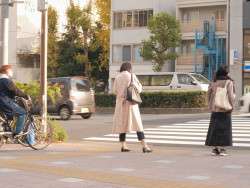
September 16, 2011
Sacrifice, Teamwork & Optimism
Noble restraint leaves no doubt of Japan's recovery
By Metropolis
Originally published on metropolis.co.jp on September 2011

During my seven years in Japan, one of the most interesting and unusual aspects of Japanese culture I experienced was that of jishuku.
Simply put, jishuku refers to the act of voluntary restraint or the use of moderation in one’s actions or activities. This typically occurs after a terrible event or occurrence, in particular when there has been loss of life or human suffering. In April 2005, in Hyogo Prefecture near Osaka, a seven-car commuter train derailed, killing 106 passengers and injuring over 550 others. In August, four months later, the annual fireworks festival held by the local city—usually drawing tens of thousands of spectators—was canceled out of this sense of self-control.
The March 11, 2011 earthquake and tsunami brought immeasurable devastation to the north east coast of Japan. In April, the usually festive and much revered season of hanami saw significantly fewer people out and about drinking and enjoying themselves during parties. Extravagant weddings were scaled back, travel plans canceled, and frivolous shopping trips abandoned.
But the most fascinating aspect of jishuku is that nobody is forced into it. Rather, it’s a personal choice. It is a way of showing solidarity during a time of crisis. During the current sweltering Japanese summer, and the ongoing power supply issues resulting from the disabled Fukushima Daiichi Nuclear Power Station, saving power—or setsuden—is more important than ever. Air conditioners have been set at 28 degrees rather than 26, lights are being turned off, and workers are using the stairs, rather than the elevator.
Despite these little sacrifices, few people are complaining. Risa, a 40-year-old office worker in Osaka says, “some public areas like train stations and supermarkets are dim, and a bit hot to save electricity. But I don’t feel inconvenienced at all, it’s bearable.”
It is this sense of community and selflessness that I believe to be one of Japanese people’s most admirable and inimitable qualities. The teamwork, synergy and the consciousness that one’s actions can—and do—affect the lives of others.
Notwithstanding, Japan has significant obstacles to overcome: massive national debt, a high yen undermining the export dependent economy, a stagnant birth rate, aging population and fewer taxpayers to support them. Fundamental economic and social security reforms must be developed and implemented swiftly. Recently, English language university teachers I have spoken to refer to the younger population as “lost” and “lacking hunger,” compared with emerging powers like China and Korea.
Yet I still get the sense that many are optimistic, if not a little anxious, about the future, and are working hard for a full recovery. I hope that this sense of unity and diligence triumphs, and this great nation recuperates and prospers again.
Previous Last Word:
Astroboy vs. Godzilla







